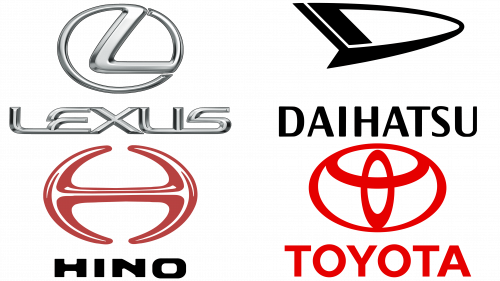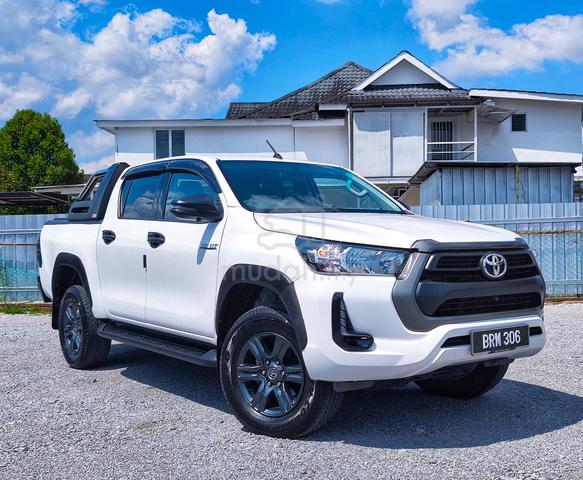Car Brands Owned By Toyota: A Comprehensive Guide to the Automotive Giant’s Diverse Portfolio cars.truckstrend.com
Toyota Motor Corporation stands as an undisputed titan in the global automotive industry. Renowned for its unwavering commitment to quality, reliability, and innovative engineering, Toyota’s influence extends far beyond its eponymous marque. What many consumers might not fully realize is the strategic web of ownership and collaboration that underpins Toyota’s vast enterprise, encompassing several distinct car brands, each serving specific market segments and strategic objectives.
Understanding which car brands are owned by Toyota is crucial for appreciating the company’s comprehensive approach to mobility, its reach across various consumer demographics, and its multifaceted strategy for sustainable growth. From luxury vehicles to compact city cars and heavy-duty trucks, Toyota’s corporate umbrella covers a diverse array of automotive solutions designed to meet the unique demands of global markets. This article will delve into the intricacies of Toyota’s brand portfolio, exploring the history, purpose, and significance of each entity under its formidable ownership.
Car Brands Owned By Toyota: A Comprehensive Guide to the Automotive Giant’s Diverse Portfolio
The Genesis of Toyota’s Multi-Brand Strategy
Toyota’s journey to becoming a multi-brand powerhouse is rooted in a shrewd business strategy aimed at diversification, market penetration, and technological synergy. Rather than relying solely on the Toyota brand to cater to every possible customer need, the company strategically acquired or developed distinct brands to target specific niches, bypass brand perception limitations, and expand its global footprint.
This strategy allows Toyota to:
- Target Different Demographics: Create premium offerings for luxury buyers, economical options for budget-conscious consumers, and specialized vehicles for commercial use.
- Mitigate Brand Dilution: Maintain the core values of the Toyota brand (reliability, practicality) while allowing other brands to explore different design philosophies, performance characteristics, or price points without compromising the parent brand’s identity.
- Foster Innovation and Competition: Allow semi-autonomous divisions to pursue distinct technological paths or design trends, fostering internal competition and driving overall innovation within the group.
- Expand Market Reach: Leverage existing brand recognition in certain regions or segments (e.g., compact cars in Japan, trucks globally) to gain market share more effectively.

This strategic foresight has enabled Toyota to build an automotive empire that is resilient, adaptable, and capable of addressing the multifaceted demands of the modern automotive landscape.
Lexus: The Pinnacle of Luxury and Performance
Perhaps the most recognizable and significant brand fully owned by Toyota is Lexus. Launched in 1989, Lexus was conceived to challenge established luxury marques like Mercedes-Benz and BMW, particularly in the North American market. Toyota recognized that while its own brand was synonymous with reliability and value, it lacked the prestige and perceived refinement to compete effectively in the high-end luxury segment.
Key Characteristics:
- Founding Principle: To create a luxury vehicle that surpassed European rivals in quality, refinement, and customer service. The flagship LS 400 sedan famously achieved this, redefining expectations for luxury cars.
- Target Audience: Affluent buyers seeking premium comfort, advanced technology, serene driving dynamics, and unparalleled reliability.
- Distinct Identity: While sharing some underlying platforms and technologies with Toyota vehicles, Lexus models feature unique designs, higher-grade materials, more sophisticated interiors, and often more powerful engine options, including a strong focus on hybrid powertrains.
- Global Presence: Lexus has successfully established itself as a leading luxury brand across North America, Europe, Asia, and other key markets.
- Innovation Focus: Lexus often serves as a testing ground for Toyota’s cutting-edge technologies, from advanced safety systems to innovative hybrid and electric powertrains, before they trickle down to the broader Toyota lineup.

Lexus operates with a significant degree of autonomy, fostering its own distinct brand identity, design language, and customer experience, all while benefiting from Toyota’s vast engineering resources and manufacturing prowess.
Daihatsu: The Master of Kei Cars and Compact Vehicles
Daihatsu Motor Co., Ltd. represents Toyota’s long-standing commitment to compact and micro vehicles, particularly for the Japanese domestic market and emerging economies. Toyota initially acquired a controlling interest in Daihatsu in 1998 and completed its full acquisition in 2016, making it a wholly-owned subsidiary.
Key Characteristics:
- Primary Focus: Specializes in "kei cars" (light automobiles) for the Japanese market – a unique category of ultra-compact vehicles with strict size and engine displacement limits, offering tax and insurance benefits.
- Global Role: Serves as Toyota’s primary producer of small cars and entry-level vehicles for developing markets across Southeast Asia and other regions, where affordability and maneuverability are paramount.
- Technological Contribution: Daihatsu’s expertise in developing lightweight, fuel-efficient, and space-efficient platforms is invaluable to the Toyota group, especially as global demand for smaller, urban-friendly vehicles grows.
- Product Range: Beyond kei cars, Daihatsu produces a range of compact hatchbacks, sedans, and SUVs, often rebadged or sold alongside Toyota models in certain markets.
- Collaborative Development: Daihatsu often collaborates with Toyota on small car platforms and engines, ensuring shared efficiencies and technological advancements.
Daihatsu’s integration into the Toyota group allows the parent company to dominate the compact and micro-car segments, a crucial part of its global sales strategy, especially in densely populated urban areas and price-sensitive markets.
Hino Motors: The Heavy-Duty Powerhouse
Hino Motors, Ltd. is Toyota’s dedicated subsidiary for the production of commercial vehicles, including trucks and buses. Toyota acquired a majority stake in Hino in 2001, solidifying its position in the heavy-duty vehicle segment.
Key Characteristics:
- Primary Focus: Design, manufacture, and sale of medium-duty and heavy-duty trucks, as well as buses and diesel engines.
- Global Reach: Hino is a significant player in the global commercial vehicle market, with a strong presence in Asia, North America, Australia, and other regions.
- Reliability and Durability: Hino vehicles are known for their robustness, durability, and reliability, essential attributes for commercial operations where uptime is critical.
- Technological Integration: Hino benefits from Toyota’s research and development in areas like hybrid technology and advanced safety systems, adapting them for commercial vehicle applications.
- Complementary Business: Hino complements Toyota’s passenger vehicle business by providing a comprehensive solution for logistics, public transportation, and industrial needs.
Hino Motors ensures that Toyota’s influence extends beyond passenger cars into the vital commercial sector, providing reliable transportation solutions for businesses worldwide.
Subaru (Partial Ownership and Collaboration)
While not a wholly-owned subsidiary, Subaru Corporation (formerly Fuji Heavy Industries) represents a significant strategic alliance and a substantial minority ownership for Toyota. Toyota first acquired a stake in Subaru in 2005 and has progressively increased its shareholding over the years, solidifying a deep technical and business partnership.
Key Characteristics of the Relationship:
- Strategic Alliance: Toyota holds a significant minority stake (currently over 20%), making it Subaru’s largest shareholder. This is a partnership, not full ownership.
- Shared Platforms: The most notable outcome of this alliance is the joint development of sports cars like the Toyota GR86 and Subaru BRZ, which share a platform and engine.
- Technological Exchange: Toyota provides hybrid and electrification technology to Subaru, while Subaru shares its expertise in all-wheel-drive systems and Boxer engines.
- Manufacturing Collaboration: Subaru manufactures some Toyota models (e.g., the Camry for a period in the U.S.) in its plants, leveraging production efficiencies.
- Mutual Benefit: The partnership allows Subaru to access Toyota’s global scale and resources, while Toyota gains access to Subaru’s niche engineering capabilities and dedicated customer base.
This strategic partnership allows Toyota to benefit from Subaru’s unique engineering prowess and brand appeal without fully absorbing the company, highlighting a flexible approach to corporate expansion.
R&D and Emerging Ventures: The Future of Toyota’s Portfolio
Beyond these core automotive brands, Toyota is also heavily invested in a myriad of research and development ventures, often through subsidiaries or strategic partnerships focused on future mobility. While not "car brands" in the traditional sense, entities like Woven by Toyota (which absorbed Toyota Research Institute – Advanced Development, or TRI-AD) are critical to the group’s long-term vision. Woven by Toyota focuses on autonomous driving, AI, robotics, and smart city infrastructure, laying the groundwork for Toyota’s next generation of mobility solutions. These ventures underscore Toyota’s commitment to not just building cars, but shaping the future of transportation itself.
Practical Advice and Actionable Insights
For consumers, understanding Toyota’s brand ownership provides valuable insights:
- Quality Assurance: Regardless of the brand (Lexus, Daihatsu, Hino), the underlying commitment to quality, durability, and reliability that defines Toyota often permeates its subsidiaries.
- Parts and Service: While each brand has its own service network, the vastness of Toyota’s global supply chain often means good availability of parts and trained technicians, even for less common models.
- Resale Value: Toyota and Lexus vehicles consistently rank high in resale value, a testament to their reliability and market demand.
- Choosing the Right Vehicle: If you appreciate Toyota’s engineering but seek a more luxurious experience, Lexus is the clear choice. If you’re in a market where compact, fuel-efficient vehicles are key, Daihatsu’s offerings might be more suitable. For commercial needs, Hino is the specialist.
- Technological Convergence: Many innovations developed by one brand within the Toyota family often find their way into others, ensuring a trickle-down of advanced features.
Key Information Summary Table: Car Brands Owned By Toyota
| Brand Name | Relationship to Toyota | Primary Focus/Market | Key Characteristics | Price Segment (General) |
|---|---|---|---|---|
| Toyota | Parent Company | Global Mass Market (Passenger Cars, SUVs, Trucks) | Reliability, Quality, Value, Fuel Efficiency, Hybrid Leadership, Global Reach | Mid-Range to Upper-Mid |
| Lexus | Wholly-Owned Subsidiary | Global Luxury Vehicle Market | Premium Quality, Refinement, Advanced Technology, High Customer Service, Strong Hybrids | Luxury |
| Daihatsu | Wholly-Owned Subsidiary | Japan (Kei Cars), Southeast Asia (Compact Vehicles) | Compactness, Fuel Efficiency, Affordability, Maneuverability, Small Car Expertise | Entry-Level to Compact |
| Hino Motors | Wholly-Owned Subsidiary | Global Commercial Vehicle Market (Trucks & Buses) | Durability, Reliability, Commercial-Grade Performance, Heavy-Duty Applications | Commercial/Industrial |
| Subaru | Significant Minority Shareholder | Global Passenger Cars (AWD, Boxer Engines, Performance) | All-Wheel Drive, Boxer Engines, Safety, Driver Focus, Niche Performance | Mid-Range to Upper-Mid |
Note: The "Price Segment" is a general indication and can vary significantly based on model, trim, and market.
Frequently Asked Questions (FAQ)
Q1: Is Toyota the largest automaker in the world?
A1: Toyota frequently ranks as one of the largest, if not the largest, automaker by sales volume globally, often vying for the top spot with Volkswagen Group.
Q2: Does Toyota own Mazda or Suzuki?
A2: No, Toyota does not own Mazda or Suzuki. However, Toyota and Mazda have a strategic alliance involving joint manufacturing facilities in the US and sharing of technologies (e.g., Toyota providing hybrid tech to Mazda, Mazda providing small car tech to Toyota). Similarly, Toyota and Suzuki have a partnership focused on sharing hybrid and compact vehicle technologies for certain markets.
Q3: Are Lexus cars just rebadged Toyotas?
A3: While Lexus cars often share platforms and core technologies with Toyota models, they are distinctly engineered, styled, and positioned. Lexus vehicles feature higher-grade materials, more refined suspensions, unique powertrains, and a focus on luxury amenities and a premium customer experience that differentiate them significantly from their Toyota counterparts.
Q4: Why does Toyota own so many brands?
A4: Toyota’s multi-brand strategy allows it to diversify its market reach, target different consumer segments (luxury, compact, commercial), mitigate brand dilution, foster internal innovation, and leverage economies of scale in manufacturing and R&D across a broader product portfolio.
Q5: Does Toyota own any other major companies outside of vehicles?
A5: Yes, Toyota is a vast conglomerate. Beyond its automotive brands, it has interests in financial services (Toyota Financial Services), robotics, housing, and various advanced technology ventures (like Woven by Toyota for autonomous driving and smart cities).
Conclusion
Toyota’s ownership of a diverse portfolio of car brands is a testament to its strategic vision and adaptability in the dynamic automotive landscape. From the opulent luxury of Lexus to the utilitarian efficiency of Daihatsu and the robust reliability of Hino, each brand plays a crucial role in Toyota’s overarching mission to provide comprehensive mobility solutions worldwide. The strategic partnership with Subaru further highlights Toyota’s flexible approach to expansion and collaboration. By understanding these intricate relationships, consumers gain a deeper appreciation for the breadth and depth of Toyota’s engineering prowess, its commitment to quality across various segments, and its enduring influence on the global automotive industry. Toyota is not just a car company; it’s a mobility ecosystem, carefully cultivated to meet the demands of today and anticipate the needs of tomorrow.


